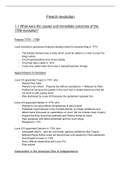Summary
Summary Access to History for Cambridge International AS Level: Modern Europe , ISBN: 9781510448858 Unit 2 (French revolution) - Outline study
- Course
- Institution
- Book
An in-depth summary of the french revolution including everything you need to know about Louis XVI, the Directory, Napoleon...
[Show more]




